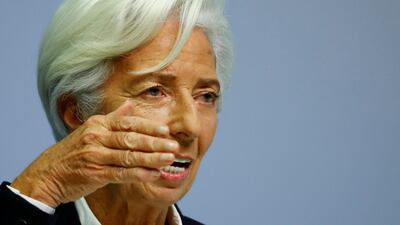German Chancellor Angela Merkel told European Union leaders she’s ready to back a huge stimulus package to rebuild the economy after hearing a dire assessment of the outlook from the central bank president.
On a videoconference that began on Thursday afternoon, Christine Lagarde told heads of government that the European Central Bank sees the euro-area economy shrinking by as much as 15 per cent as a result of the pandemic, and that they risk doing too little, too late, according to sources.
One of the officials said the 15 per cent figure was the extreme scenario, with the ECB president saying her baseline estimate is a 9 per cent cut in output this year.
Mrs Merkel indicated that the EU should double the €540 billion (Dh1.98 trillion) rescue plan drawn up by finance ministers two weeks ago, officials said, as leaders set out their proposals for mitigating the economic fallout from the virus.
With more than 100,000 fatalities in the region, Europe has been hard hit by Covid-19 and the fallout from the crisis has exposed long-standing divisions over who pays for what. Strict lockdowns have shuttered factories and halted travel, pitching the bloc into the worst recession in living memory while leaders have been arguing over how to spread the financial burden of the rebuilding effort.
European Commission President Ursula von der Leyen told the call that not even in the Second World War there was such deep contraction in output as the one expected this year and only in the Great Depression would they see anything of similar magnitude, according to two officials. But beyond the average figure, both the depth of contraction and the speed of recovery will be very uneven due to differences in fiscal space among countries, distorting the level playing field in the bloc’s single market, Ms von der Leyen warned.
Yet despite that sobering assessment of the economic destruction, the meeting risked descending into a standoff between those member states demanding the recovery is funded via grants from a supercharged EU budget and those insisting the additional funds should take the form of loans.
An EU official said the commission will be asked to come up with a compromise proposal on the budget bridging the disparate views and no decision is expected on Thursday. According to the draft of the commission’s plan seen by Bloomberg on Wednesday, some disbursements will be loans and the other half will be effectively handouts.
Economic data on Thursday illustrated the recession is proving to be worse than many early predictions. Measures of private-sector business activity plunged more than expected to an all-time low, and signalled record job cuts. Corporate and consumer confidence slumped in the bloc’s biggest economies.
So far most fiscal action has been by national governments, raising fears among officials and investors that an uneven response will tip the currency area into another financial crisis later on.
The ECB has led the European-level response, pouring liquidity into the financial system and taking steps to ensure the cash can reach deep into the euro zone.
It has pledged to buy more than €1 trillion of debt over the rest of this year, and removed most of its self-imposed limits to allow it to target areas of market such stress such as Italian bonds. It has also ramped up programmes making it easier for banks to lend to virus-hit companies, including accepting some junk-rated debt as collateral.

